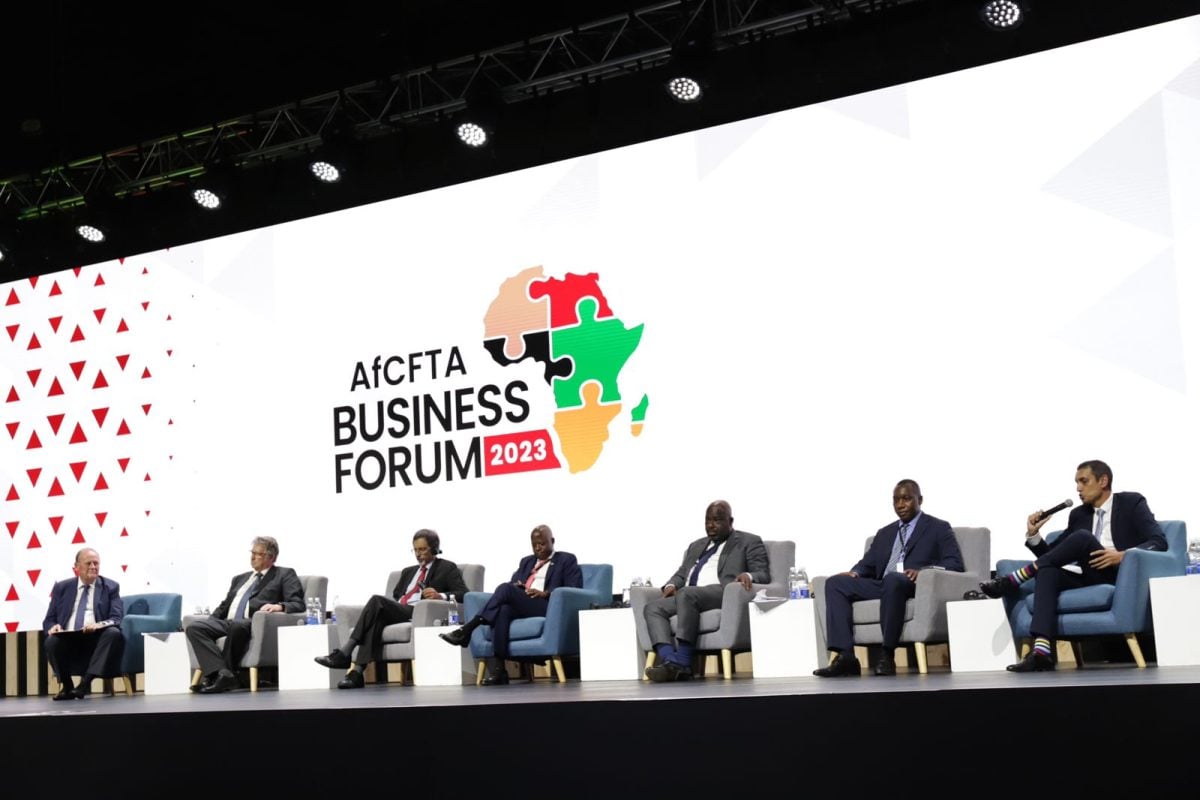Africa’s businesses threw their weight behind the inaugural African Continental Free Trade Area Business Forum held in Cape Town in April, which brought together several hundred people from many countries and industries to discuss the private sector’s role in the initiative, writes Dianna Games.
The strong attendance reflects an impatience by companies for information on how they may benefit from the process, which has been strongly marketed as a solution to the fragmentation and underdevelopment of the continent.
The key objectives of the event were to create awareness of the current trade and investment opportunities in AfCFTA; connect businesses to funding opportunities in value chains; establish a private sector engagement platform on implementation; and to examine ways to promote a private sector-friendly environment.
Secretary General of the AfCFTA Secretariat, Wamkele Mene, said the initiative has provided Africans with an opportunity to formulate a new type of agreement that places development and inclusivity at its heart, but reminded participants of the urgency of implementation given global economic headwinds.
“Africa’s private sector accounts for 80% of production and 90% of industrialisation. Thus, the need to establish the private sector as one of the pillar for the success of the AfCFTA,” he told the audience.
The AfCFTA’s private sector strategy earmarks agriculture and agro-processing, pharmaceuticals, transportation, logistics, and automotives as sectors that can bring immediate and exponential change to the continent’s fortunes.
But speakers admitted that the challenges of implementation are still immense, particularly with regard to non-tariff barriers. As one businessman said, the reality is that it is easier to get mobile phones from China to Africa than to move a few bags of maize across an African border post.
The lack of harmonisation of standards and regulations across borders makes trade complex and expensive. It also undermine the competitiveness of goods even with duty and tariff advantages, and prevents mass production and scaling of manufacturing.
The need for companies to adhere to different rules and standards across 54 countries, undermines the essence of the AfCFTA, as do continuing constraints on the free movement of people. In a headline speech, South Africa deputy president Paul Mashatile said infrastructure is another major impediment to cross-border trade.
“There exists continental-wide consensus on the need for Africa to reduce structural and regulatory barriers to market entry and to invest in the necessary infrastructure to facilitate Intra-African and global trade, more so road and maritime infrastructure. The quality of much of the continent’s maritime, road and railway infrastructure are less than satisfactory. There are few road links, general poor road infrastructure maintenance and limited regional road linkages throughout the continent’s five regions.”
But it is clear much is being done behind the scenes. The eight-country pilot study to trade goods under the AfCFTA has been progressing well, Wamkele said, and a second phase will begin in mid-2023. Other tools and instruments are beginning to take effect, he argued.
“The availability of operational instruments and tools such as the e-tariff book, negotiation of 88% on Rules of Origin tariff lines, customs harmonisation and others…the stage is set for boosting intra-African trade,” Mene said.
New initiatives to the fore
Continental heavyweights such as the African Development Bank, Afreximbank and the Africa Finance Corporation outlined their support through funding of a range of specific activities and initiatives.
Afreximbank is assisting the African Regional Standards Organisation to harmonise 155 standards in three priority areas – automotives, pharmaceuticals and medical equipment – with work also under way with regard to textiles.
These sectors have been targeted as drivers of the industrialisation Africa needs to boost manufacturing and reduce a reliance on imports and to ensure greater self-sufficiency.
Currently, Africa only accounts for 1.2% of world auto production and 2% of value addition.
At present, just 30% of African companies are capable of producing goods at scale, according to one minister.
Suggested solutions to build scale included ramping up investment in value chains, aggregating volumes and creating hubs for components and different parts of value chains in different sectors.
New payments infrastructure will also prove crucial to business confidence, attendees argues. Afreximbank is backing the Pan African Payments Settlement System (PAPSS), which aims to reduce the costs of doing business in Africa by enabling companies to trade on the continent in their national currencies. This will save the continent a collective $5bn a year, which is the current cost of using correspondent banks overseas for intra-African payments.
“Africa spends over $19.4 billion a year in payment and settlement. The launched of PAPSS would address that and reduce the dependence on other currency, making the cost of doing business across the continent cheaper,” Mene said.
The institution currently supports the system with a $500m facility to guarantee settlement finality, with the intention to increase this to $3bn and more once it moves beyond the current pilot involving six countries in West Africa.
There are other protocols which are still being negotiated. These are on intellectual property rights, competition policy, investment and digital trade.
Digital transformation featured high on the agenda, given its potential to drive greater economic efficiency and scale, interconnectedness and financial inclusion. Other initiatives, such as expanding digital identity programmes to increase access to opportunity and services, are also said to be in the works.
Need for SME and women engagement
The event highlighted the significant volume of work being done under the AfCFTA and the large amounts of funding lining up behind innovative products and services.
But a critical element still remains how businesses can connect with the initiative on the ground and benefit from it, particularly SMEs. Some argue that the initiative is still being driven at a high level and the trickle-down effect is limited, despite programmes specifically targeted at small business and particularly women and youth.
“We must not forget that SMEs are the backbone of Africa’s economies and that closing persistent gender gaps for women in Africa is a must,” Sanda Ojiambo, assistant secretary-general; executive director & CEO of the UN Global Compact, told the audience.
“It will take women to unlock their opportunity in the AfCFTA. But women must gather together and strengthen their sisterly bonds to build winning strategies and multiply success,” she added.
In closing the forum, Mene agreed that much work on behalf of the AfCFTA Secretariat and the business community to fulfil the trade areas’ goals.
“Our resolve to deliver on the AfCFTA promise must not be defined by the challenges we face, but the outcome of lifting over 100 million African from poverty & unearthing a market of over $2.5 trillion for the people of Africa.”
Want to continue reading? Subscribe today.
You've read all your free articles for this month! Subscribe now to enjoy full access to our content.
Digital Monthly
£8.00 / month
Receive full unlimited access to our articles, opinions, podcasts and more.
Digital Yearly
£70.00 / year
Our best value offer - save £26 and gain access to all of our digital content for an entire year!

 Sign in with Google
Sign in with Google 



